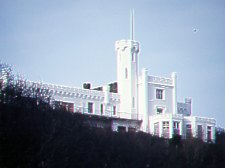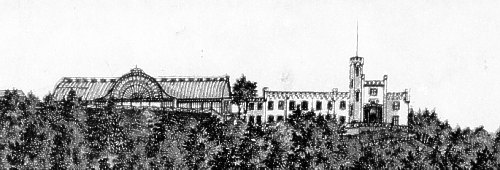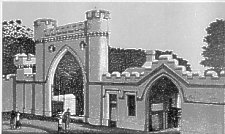|
|
Designed by John Robinson as residence of John Stanway Jackson, manager of Bank of Mona, who was major prize winner in the lottery organised to sell off this part of the Castle Mona estate. The gateway house to Falcon Cliff on the sea front had an upstairs room that was adapted for use as a congregational chapel following dissension at Athol Street Chapel. |
|
|
|
|
On completion of the Bank of Mona building in Buck's Road in 1855, J.S.Jackson moved out and Mrs Okell occupied Falcon's Cliff. By 1877 the house had become a hotel, with part of its large grounds becoming a popular sports arena. During the late 1880's a large dance hall pavillion was also erected but when the Derby Castle and Palace consortium managed to gain control in the 1890's this was demolished to restrict competition. |
|
|
The hotel continued into the 1980's - its position high above Douglas always meant that access would be a problem and in 1887 a cliff railway was installed to give easier access from the sea front. This was dismantled in 1896 on demolition of the Dance Hall and sold to Port Soderick; a second, on a different route, was installed in 1927 and operated until the hotel closed c.1990 (some of the remains are still present). It is possible that the path of the original railway was re-used to provide a seated escalator access to Cunningham's Camp as during WW1 when the camp served as an internment camp an adjacent field was obtained as a recreational area for the newly established privilege camp and the building, possibly the hotel end of the original cliff railway, at the boundary of the field converted into a toilet block. After closure, unlike many other registered buildings in Douglas, it was not demolished but carefully restored as an impressive office complex. |
|



